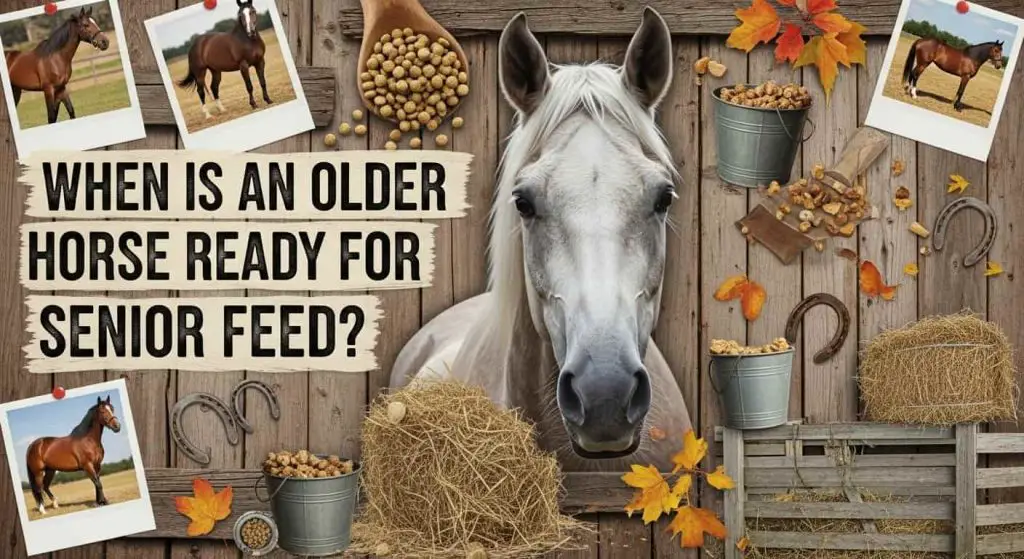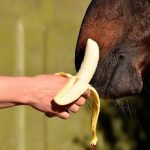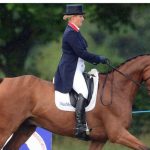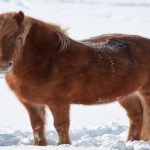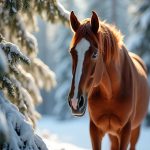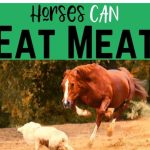Your beloved horse has been with you through thick and thin, and as they age, their needs change just like ours do. You’ve noticed they’re not as sprightly as they used to be, and you’re wondering if it’s time to switch to senior feed.
Making the right dietary choices for your older horse is crucial to their health and happiness. But how do you know when the time is right? This is not just about nutrition; it’s about ensuring your horse enjoys their golden years to the fullest.
Dive into this guide where you’ll uncover the signs that indicate your equine friend is ready for senior feed, and discover how this change can transform their quality of life. Let’s ensure your horse stays healthy, happy, and vibrant for years to come.
Signs Of Aging In Horses
Aging is a natural part of life for horses. Recognizing the signs early helps determine the need for senior feed. A horse’s physical appearance, behavior, and health can provide clues. Understanding these signs ensures your horse stays healthy and comfortable.
Physical Changes
Older horses often show physical changes. Their coat may become dull and gray. Weight loss is common, especially around the backbone. Muscle mass may decrease, causing a bony appearance. Teeth wear down, making it hard to chew.
Joint stiffness and arthritis can also occur. Horses may move more slowly. Observing these physical changes is important. It helps identify the right time for dietary adjustments.
Behavioral Shifts
Behavior changes in aging horses are noticeable. They may become less active and playful. Interaction with humans or other horses might decrease. Older horses may show a preference for resting. They might be reluctant to exercise or work.
Recognizing these behavioral shifts provides insights into their well-being. It’s crucial for adapting their care and diet.
Health Considerations
Health issues become more frequent in older horses. Dental problems can lead to chewing difficulties. Digestive efficiency decreases, affecting nutrient absorption. Older horses may be prone to colic and laminitis.
Increased risk of respiratory issues is also possible. Monitoring health signs allows for timely intervention. It helps decide when senior feed is necessary for their diet.
Nutritional Needs Of Senior Horses
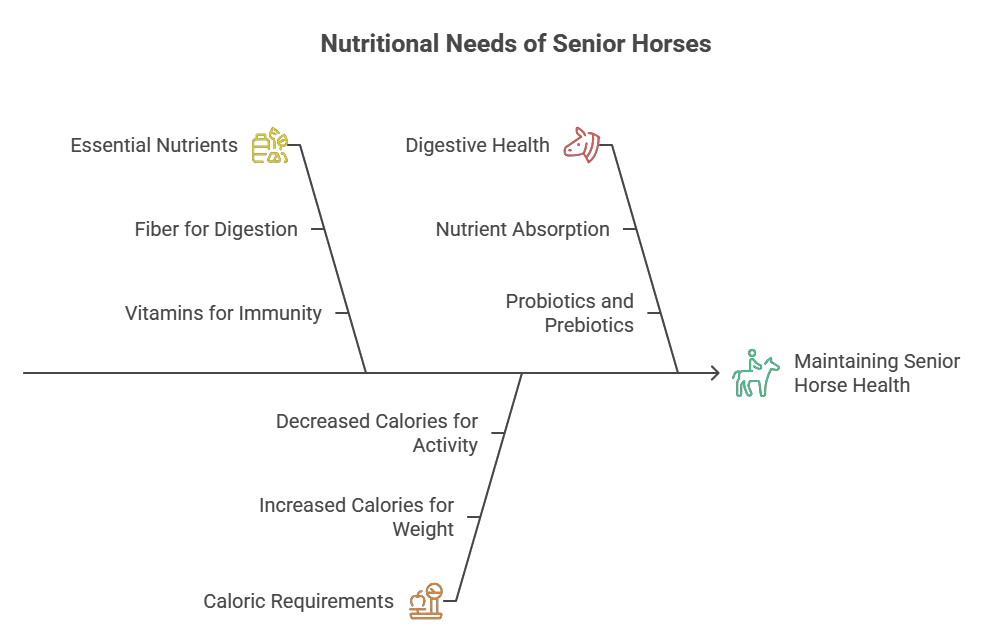
As horses age, their nutritional needs evolve significantly. Understanding these changes is crucial for maintaining their health and vitality. Senior horses often require specific nutrients to support their joints, digestion, and overall wellness. Transitioning them to senior feed can be a proactive step in providing these essential nutrients. But how do you know when your older horse is ready for this change? Let’s dive into the nutritional needs of senior horses to help you make an informed decision.
Essential Nutrients
Senior horses benefit from a diet rich in fiber, vitamins, and minerals. These elements play a vital role in maintaining their health. Fiber aids digestion and helps prevent colic, a common issue in older horses. Vitamins such as A, D, and E support immune function and skin health. Minerals like calcium and phosphorus are essential for bone strength. Is your horse showing signs of wear or slow recovery? Consider these nutrients in their feed.
Caloric Requirements
Aging horses often have different caloric needs than their younger counterparts. Senior horses might need more calories to maintain their weight due to decreased metabolism. Alternatively, some may require fewer calories if their activity level drops. Observing your horse’s weight and energy levels can guide you in adjusting their caloric intake. Have you noticed your horse losing weight or becoming lethargic? It might be time to reassess their caloric needs.
Digestive Health
Digestive health is a cornerstone of a senior horse’s well-being. Older horses can experience a decline in digestive efficiency. They may struggle to absorb nutrients effectively, leading to potential deficiencies. Senior feeds are often formulated to enhance digestion and nutrient absorption. Probiotics and prebiotics in these feeds can support gut health. Is your horse experiencing digestive issues or inconsistent bowel movements? This may signal a need for dietary adjustments.
Feeding your senior horse isn’t just about throwing a scoop of feed in their bucket. It’s a nuanced process that requires you to be observant and proactive. Are you ready to make the switch to senior feed? By focusing on essential nutrients, caloric requirements, and digestive health, you’re setting the stage for a healthier life for your horse.
Benefits Of Senior Feed
Older horses show signs of needing senior feed through weight loss, dental issues, or slower recovery. Senior feed supports joint health and provides easily digestible nutrients. This specialized feed ensures older horses receive essential vitamins and minerals.
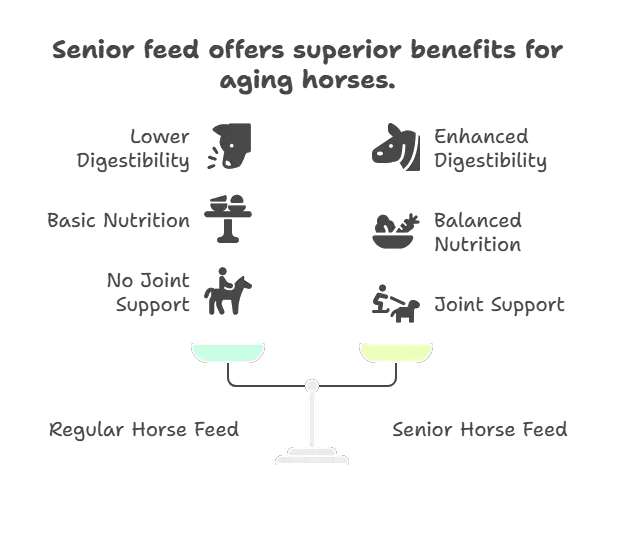
As horses age, their nutritional needs change, just like ours do. Senior feed is specially formulated to meet these changing needs, providing essential nutrients that older horses require. But why should you consider switching your older horse to senior feed? Let’s delve into the specific benefits that make this feed a smart choice for your equine friend.
Enhanced Digestibility
Older horses often face digestive challenges due to a less efficient gastrointestinal system. Senior feed addresses this by being easier to digest. This means your horse can absorb more nutrients from every bite, ensuring they get the most out of their meals. A friend of mine noticed her 20-year-old mare, Bella, wasn’t maintaining her weight as she used to. Switching to senior feed made a noticeable difference, as Bella started to regain her healthy condition. Have you observed any changes in your horse’s digestion or weight?
Balanced Nutrition
Senior feed is meticulously balanced to provide all the essential nutrients that aging horses need. It contains the right mix of proteins, fats, vitamins, and minerals. This balance helps to support their overall health and vitality. Imagine your horse as a seasoned athlete; they need a diet that supports their active lifestyle, even as they age. Senior feed offers this by ensuring they get what they need without any unnecessary fillers.
Support For Joint Health
Joint health becomes increasingly important as horses age, just like with people. Senior feeds often include ingredients like glucosamine and chondroitin. These nutrients help maintain joint flexibility and comfort. Consider if your horse seems stiff or less willing to move—these could be signs of joint discomfort. Switching to a senior feed could provide the support they need to stay active and comfortable. Incorporating senior feed into your horse’s diet isn’t just about age; it’s about ensuring they continue to live a healthy, happy life. Have you tried senior feed for your older horse yet? The benefits might surprise you!
Assessing Your Horse’s Condition
Determining the right time for senior feed involves observing changes in your older horse’s weight and energy levels. Notice if the horse shows difficulty in maintaining condition or loses muscle mass. These signs can indicate a need for dietary adjustments.
As your horse ages, you might wonder if it’s time to switch to senior feed. Knowing when to make this transition can significantly impact your horse’s health and longevity. Assessing your horse’s condition is crucial in making an informed decision. Let’s dive into the key areas you should evaluate to determine if your older horse is ready for senior feed.
Body Condition Scoring
Body condition scoring (BCS) is a practical way to evaluate your horse’s weight and overall health. This scoring ranges from 1 to 9, with 1 being extremely thin and 9 being obese. Regularly checking your horse’s BCS helps you notice any changes in their physique. A horse with a score of 4 to 6 is typically in a healthy range. If your older horse is losing weight despite good nutrition, it might be time to consider senior feed. This specially formulated feed can provide the additional nutrients needed to maintain a healthy weight.
Dental Health Evaluation
Dental health is often overlooked but plays a crucial role in your horse’s ability to chew and digest food. Older horses can develop dental issues, such as worn or missing teeth, which can make eating difficult. Schedule a dental check-up to ensure your horse’s teeth are in good condition. If your horse struggles to chew, senior feed may be an excellent option. It’s designed to be softer and easier to digest, ensuring your horse gets the nutrition it needs.
Veterinary Consultation
Consulting with your veterinarian is vital when assessing your horse’s readiness for senior feed. They can provide a comprehensive health evaluation and nutritional advice tailored to your horse’s specific needs. Discuss any concerns you have about your horse’s weight, energy levels, and overall health with your vet. They might suggest blood tests or other diagnostics to rule out underlying health issues. With their guidance, you can make an informed decision about transitioning to senior feed. Are you noticing changes in your horse’s health that might warrant a diet change? Taking proactive steps now can make a significant difference in your horse’s quality of life. Senior feed might just be the supportive boost they need.
Choosing The Right Senior Feed
Choosing the right senior feed is crucial for older horses. Their nutritional needs change as they age. Selecting the right feed ensures they stay healthy and active. Senior feeds offer tailored nutrition for aging horses. But how do you choose the right one?
Ingredients To Look For
Look for high fiber content in senior feeds. Fiber supports digestion in older horses. Protein is essential for muscle maintenance. Ensure the feed has adequate protein levels. Vitamins and minerals are crucial for overall health. Check for added vitamins E and C. Antioxidants help in reducing inflammation.
Brands Comparison
Different brands offer various senior feeds. Compare Nutrena and Purina for quality options. Nutrena Senior has high fiber and protein. Purina Senior Active includes added joint support. Check customer reviews for real-life experiences. Pricing can vary, so check your budget too.
Customizing Feed Plans
Every horse has unique needs. Create a customized feed plan for your horse. Consult with a vet to ensure the best diet. Adjust the feed amount based on activity levels. Monitor your horse’s weight and health regularly. Make changes to the feed plan as needed.
Transitioning To Senior Feed
As horses age, their nutritional needs evolve, and transitioning to senior feed becomes essential for maintaining their health and vitality. But how do you know when it’s time to make the switch? Understanding the process of transitioning to senior feed can be crucial for your horse’s well-being. This section will guide you through the gradual introduction of senior feed, monitoring for changes, and adjusting feeding schedules to ensure your older horse receives the nourishment it needs.
Gradual Introduction
Switching your horse’s diet suddenly can lead to digestive issues. Begin by mixing a small amount of senior feed into their current feed. Increase the proportion gradually over several weeks. This slow transition helps your horse’s digestive system adapt. Have you ever noticed how a sudden change in your own diet can upset your stomach? Horses are no different.
Monitoring For Changes
Once you start introducing senior feed, keep a close eye on your horse’s behavior and health. Look for changes in energy levels, coat condition, and weight. These signs can indicate how well your horse is adjusting to the new diet. If your horse seems lethargic or loses weight, it may be time to consult a veterinarian. Your observations are crucial in ensuring your horse’s diet is supporting its health.
Adjusting Feeding Schedules
Older horses may benefit from more frequent, smaller meals. Consider adjusting feeding schedules to accommodate their changing needs. Smaller meals can be easier to digest and help maintain energy levels. Experiment with different feeding times to find what works best for your horse. Are you willing to adapt to your horse’s needs to improve its quality of life?
Transitioning to senior feed is more than just changing what you put in your horse’s trough. It’s about observing, adapting, and ensuring your horse thrives in its golden years. Remember, your horse relies on you to make informed decisions about its diet. Are you ready to take the next step in your horse’s nutritional journey?
Common Mistakes To Avoid
Older horses need senior feed at the right time. Watch for weight loss or digestive problems. Ignoring these signs can lead to health issues.
When deciding if an older horse needs senior feed, common mistakes occur. These mistakes can impact the health and wellness of your horse. Understanding and avoiding them ensures better care for your equine friend.
Ignoring Individual Needs
Every horse is unique. Age alone doesn’t determine feed needs. Consider health, activity level, and weight. Some horses age faster, needing senior feed earlier. Others stay healthy longer on regular diets. Always evaluate each horse separately. Personalize their diet for best health outcomes.
Overfeeding Risks
Senior feeds are nutrient-rich. Overfeeding can lead to obesity. Obesity causes other health problems. Monitor portion sizes carefully. Adjust based on the horse’s weight and activity. Provide balanced nutrition without overloading calories.
Neglecting Regular Check-ups
Regular vet check-ups are crucial. They help assess the horse’s health needs. Vets provide guidance on diet changes. Skipping check-ups leads to missed health issues. Early detection of problems ensures timely dietary adjustments. Regular monitoring keeps your horse healthy and happy.
Expert Tips For Feeding Senior Horses
Feeding senior horses requires special attention and knowledge. As horses age, their dietary needs change. Providing the right nutrition ensures their health and longevity. Understanding these needs helps in making informed decisions. Here are some expert tips for feeding senior horses.
Routine Health Assessments
Regular health checks are crucial for senior horses. These assessments detect health issues early. Vets can evaluate weight, dental health, and nutrient absorption. Adjusting diets based on these checks improves health. Regular vet visits ensure dietary needs are met.
Incorporating Supplements
Older horses may need dietary supplements. Joint supplements support mobility and comfort. Omega-3 fatty acids benefit coat and skin health. Probiotics aid digestion and nutrient absorption. Consult a vet before adding supplements. This ensures they meet the horse’s specific needs.
Maintaining Hydration
Hydration is vital for senior horses. Dehydration can lead to severe health issues. Ensure clean, fresh water is always available. Soaking hay can increase water intake. Monitor water consumption daily. This simple step promotes overall health and well-being.
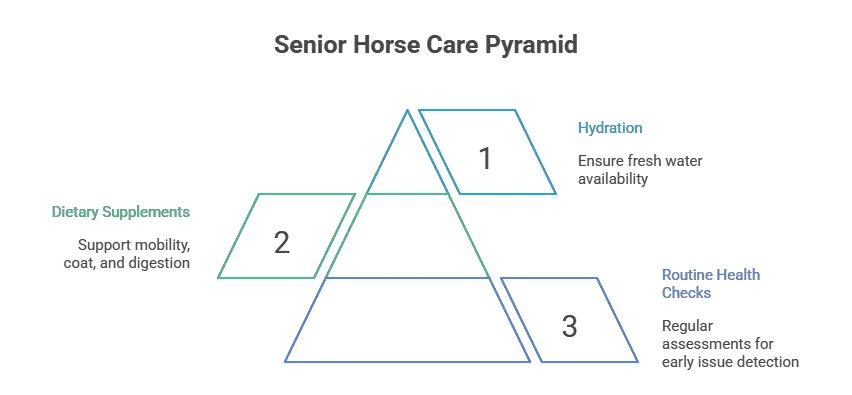
Frequently Asked Questions
What Age Defines A Horse As Senior?
Horses are generally considered senior when they reach 15 to 20 years. However, individual health and breed can influence this age. Regular veterinary check-ups help determine when a horse is transitioning into their senior years.
Why Switch To Senior Feed?
Senior feed offers balanced nutrition tailored for older horses. It ensures they receive essential nutrients for maintaining body condition and health. These feeds are often easier to digest, which is crucial for aging horses.
How Do I Know If My Horse Needs Senior Feed?
Look for signs like weight loss, difficulty chewing, or decreased energy. Regular vet assessments can help determine dietary needs. A tailored feeding plan ensures your senior horse maintains optimal health and condition.
What Benefits Does Senior Feed Provide?
Senior feed is formulated for easy digestion and nutrient absorption. It supports joint health, immune function, and overall vitality. This specialized feed helps older horses maintain weight and muscle tone.
Conclusion
Recognizing when a horse needs senior feed is crucial. Age isn’t the only factor; health and lifestyle matter too. Monitor weight changes and energy levels. Check for dental issues or digestive troubles. Consult a vet for guidance. Senior feed boosts nutrition for older horses.
It supports health and well-being in their golden years. Listen to your horse’s needs. Observing them closely ensures they’re comfortable and healthy. Adjusting their diet can make a big difference. Prioritize their care for a happy, active life. Every horse deserves the best possible support.
Keep them thriving in their senior years.

